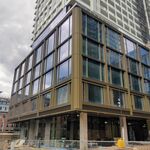lowesthangingfruit
Active Member
7 % gain annually is modest...as long as employment remains high, the government injects (as they say) some much needed funds into Ontario's manufacturing sector, our banks stay solid, investors abroad keep investing, the government sticks to their infrastructure plan, indebtedness stays relatively low, there isn't widespread panic, there is consistent population growth, and no catastrophic event that creates fear...everything will be fine.
Condo capital of the world in the sense that no where else on Earth our more condos being built in one particuliar place. Foreign investors (both builders and purchasers) are continuing to invest in our city. The condo lifestyle has become the preferred lifestyle of choice in this city and ammenities are outstanding compared to other cities throughout the world. Plus who the hell wants to shovel snow...our winters last 8 months of the year !
So condoboy, you have to admit there are alot of storm clouds gathering so I am curious re. your logic. In your view, what would have to happen to have a 20-30% (or more) drop instead of the rise you predict ??
As for the "preferred" lifestyle, I am not sure I agree. I think the main reason why condos sales have outpaced other lower density/detatched RE is because simply the latter have been priced out of reach for most buyers trying to get into the market. There will always be a market for condos and high rises, but I think most logical and reasonable ppl would prefer to own real land rather than a piece of space in the sky if they had the choice.




